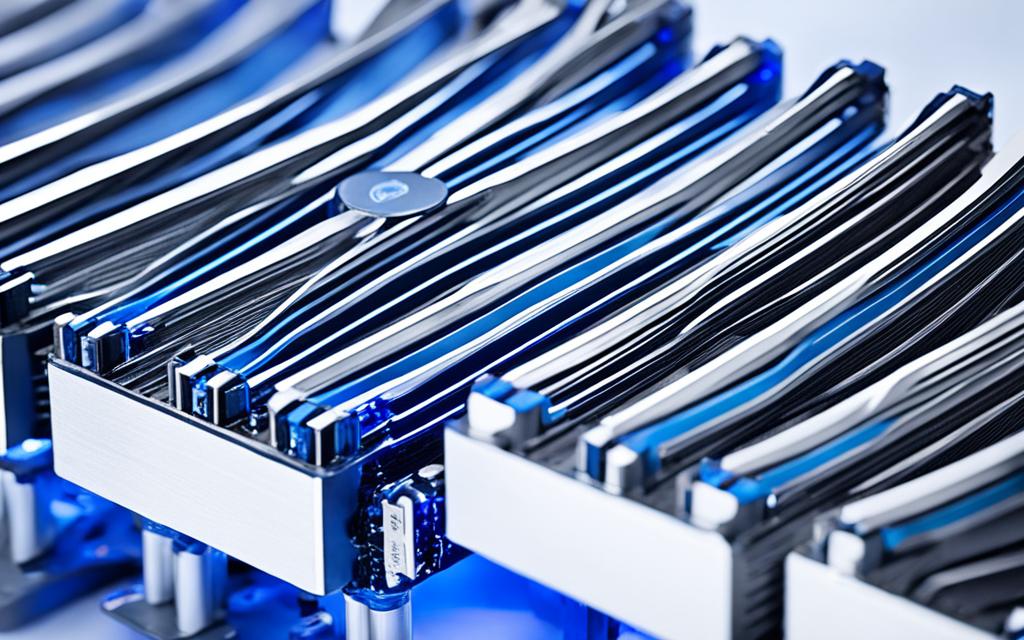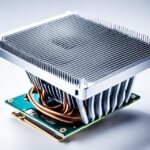Table of Contents
Choosing the right CPU cooler is important, but it can be tricky. You have to decide between universal or model-specific types for the best performance. This choice is particularly important for gamers. Most coolers work with AMD and Intel CPUs. However, some may not fit certain socket types. It’s essential to check if the cooler fits your CPU before you buy1.
When picking out a cooler, think about the socket type, TDP (Thermal Design Power), and size. This helps avoid overheating and damage1. Make sure the cooler’s TDP rating is enough for your CPU. Also, check that there’s enough space near the CPU socket for the cooler1
Key Takeaways
- Knowing if a cooler fits your CPU is key for better performance.
- Most coolers are suitable for AMD and Intel CPUs.
- It’s important to look at socket types and TDP.
- Check the cooler’s size to ensure it fits in your case.
- Not cooling properly can harm your CPU.
Understanding CPU Coolers: Basics and Importance
A CPU cooler keeps the CPU temperature in check. Knowing why cooling a CPU is key helps, as too much heat affects the system’s speed and may harm the parts. A good cooler helps the CPU work well even when doing heavy tasks, ensuring the computer lasts longer.
What is a CPU Cooler?
CPU coolers take away the heat from the CPU when it runs. There are air and liquid coolers, each fitting different needs. Air coolers use fans and heatsinks to remove heat. Liquid coolers move coolant through a radiator to keep things cool.
Why Cooling is Vital for CPU Performance
If a CPU gets too hot, it slows down to prevent damage. This is called thermal throttling. It’s essential to keep the cooler clean to help air flow well. High-quality coolers, such as the Noctua NH-D15 or the Arctic Liquid Freezer III 360 A-RGB, make less noise and cool better2.
Basic coolers that come with CPUs aren’t always enough, especially for the latest CPUs. They often don’t cool sufficiently3. Upgrading your cooling can boost your system’s efficiency and dependability greatly.
Types of CPU Coolers: Universal vs Model-Specific
Knowing the different CPU coolers helps keep your system cool and efficient. You can choose between air coolers and liquid coolers. Each type has its pros and cons, especially when it comes to fitting different CPUs and motherboards.
Air Coolers
Air coolers are popular because they’re affordable and easy to set up. They use fans and heatsinks to get rid of heat. For instance, the Noctua NH-D15S has an airflow of 82.52 CFM and is quiet at 24.6 dBA, thanks to its six heat pipes4. On the cheaper side, the Cooler Master Hyper 212 EVO V2 moves 62 CFM of air and makes noise between 8-27 dBA, using four heat pipes4.
Air coolers fit many CPU sockets, as long as there’s enough space. Yet, they might not fit with some RAMs or in small cases. Checking compatibility before buying is key It is crucial.
Liquid Coolers
Liquid coolers cool better by moving heat with liquid. The Corsair iCUE H100i Elite Capellix XT pushes 65.57 CFM of air and keeps quiet at 34.1 dBA. It has a 240mm radiator with two fans4. The Corsair H60x RGB Elite is smaller, with 47.73 CFN airflow and 28 dBA noise4.
However, liquid coolers might not fit as easily. You need to check the size of your radiator and case. It’s also important to consider motherboard connections. Being careful with these details will help avoid problems when installing56.
Are CPU Coolers Universal?
When you’re building a computer, it’s crucial to know if CPU coolers will fit. Many coolers claim to work with all CPUs, but there are key points to consider.
Socket Compatibility
Choosing the right CPU cooler means checking if it fits your CPU’s socket. Most coolers aim to be universal, fitting different sockets and brands7. If your CPU comes with a cooler, it’s usually made to fit perfectly7. Always make sure the cooler you want matches your CPU’s socket. Look at the cooler’s specs to check its compatibility.
Clearance and Size Considerations
You also need to think about how much space you have. For aftermarket coolers, consider your case’s space, RAM height, and cooler size7. Measure the cooler’s height against your case to avoid issues. Modern coolers are made to avoid blocking tall RAM sticks7. Installing the cooler correctly is also key to prevent damage7.
Liquid cooling options like AIO water coolers come in sizes like 120mm, 240mm, and 360mm. They also have universal mounting holes7. Picking the right cooler means looking at socket fit and case space.
Factors Affecting CPU Cooler Compatibility
When choosing a CPU cooler, several factors play a big role in compatibility. It’s key to know the Thermal Design Power (TDP) of your CPU. This helps decide the kind of cooler you need. Coolers are made to handle different CPU TDP rates, keeping performance high without the risk of overheating.
Thermal Design Power (TDP)
The TDP rate shows how much heat your CPU makes under usual work. For instance, CPUs with a 65W rate, like Intel i3 and AMD Ryzen 3, work well with a 120mm radiator. CPUs with a TDP from 65W to 125W, such as Intel Core i5 or AMD Ryzen 5, need a 240mm cooler. And for top-end CPUs over 125W, a 360mm AIO cooler is necessary. This avoids overheating during heavy gaming or tasks8.
Motherboard and Case Compatibility
Choosing a CPU cooler also means considering motherboard compatibility. Current CPUs use three main socket types: Intel LGA775, LGA1155, and various AMD ones, like AM2 and FM25. The cooler must fit the socket’s size and mounting points. Also, the case size matters, especially for small forms like mini-ITX, as it may restrict cooler height and affect performance.
Mounting Mechanisms
How the cooler is fitted is crucial for secure installation. AMD coolers often have clip-on designs, which are easy to install. Intel coolers usually use push-pin mechanisms that can be trickier. Paying close attention to these designs is important to avoid damaging the motherboard5.
| CPU TDP Rating | Recommended Radiator Size |
|---|---|
| 65W | 120mm |
| 65W – 125W | 240mm |
| 125W+ | 360mm |
Considering these points helps make a good choice when picking a CPU cooler. This can boost your system’s performance and its lifespan85.
Conclusion
Choosing the right CPU cooler greatly affects your computer’s performance and life. Knowing which cooler fits is key. It’s important to consider things like socket types and the size your case can handle. This knowledge is vital for keeping your CPU running well, especially for gaming or making content.
Understanding the difference between universal and specific coolizers helps you pick the right one. Most modern coolers work with different sockets thanks to various mounting options. This flexibility910 is great for future upgrades. The right choice keeps your CPU cool, preventing overheating for smoother running.
Summing up, wisely selecting your CPU cooler protects your computer and improves your tech life. Exploring compatibility helps you make informed choices. This ensures your system runs at its best. For smart decisions in tech, check out here.
Q: What is Thermal Design Power (TDP) in relation to CPU coolers?
Are CPU coolers universal or model-specific?
CPU coolers come in two main types. Universal ones fit many socket types. Model-specific coolers are made just for certain CPUs. They offer the best fit and cooling.
What is a CPU cooler?
A CPU cooler helps manage the CPU’s temperature. It keeps it from getting too hot. This is key for the CPU to work well and stay safe.
Why is cooling vital for CPU performance?
Cooling is vital because too much heat lowers performance. It can even damage the CPU. Good cooling means smooth running, especially when doing heavy tasks.
What are the types of CPU coolers?
CPU coolers are mainly air or liquid types. Air coolers use fans and heatsinks. They’re cost-effective. Liquid coolers use water and are better but harder to set up.
How does socket compatibility affect CPU coolers?
Socket type is key for fitting a cooler to a CPU. Make sure your cooler matches your CPU’s socket. This ensures it fits well and cools effectively.
What should I consider regarding clearance and size when choosing a CPU cooler?
Check your computer case size first. The cooler mustn’t block other parts. It should fit the case well for the best performance.
TDP shows the heat a cooler must handle. Choose a cooler with the right TDP for your CPU. This stops overheating and keeps your CPU stable under load.
How do motherboard specifications influence CPU cooler compatibility?
Motherboard layout and socket affect cooler choice. Big coolers might not fit all boards. Check these specs before you buy a cooler.
What mounting mechanisms should I consider when choosing a CPU cooler?
Look for a cooler with the right brackets for your board. Secure mounting is important. It helps avoid damage and ensures good cooling.
Source Links
- https://www.overclockers.co.uk/blog/how-to-check-cpu-cooler-compatibility/ – How to check CPU cooler compatibility
- https://www.linkedin.com/advice/0/how-can-you-achieve-effective-cooling-your-pc-fw1ac – How can you achieve effective cooling in your PC while keeping it silent?
- https://www.cgdirector.com/air-vs-aio-coolers/ – Air vs AIO CPU Coolers: Which One Should You Choose?
- https://www.ign.com/articles/best-cpu-cooler – Best CPU Cooler 2024 – IGN
- https://www.makeuseof.com/tag/how-to-choose-and-mount-a-cpu-fan-everything-you-need-to-know/ – How to Choose and Mount a CPU Fan: Everything You Need To Know
- https://www.pcmag.com/how-to/pc-cooling-101-how-to-buy-the-right-air-or-water-cooler-for-your-desktop – PC Cooling 101: How to Buy the Right Air or Water Cooler for Your Desktop CPU
- https://www.howtogeek.com/are-cpu-coolers-universal/ – Are CPU Coolers Universal?
- https://www.linkedin.com/pulse/how-choose-right-liquid-cooler-your-pc-vishvesh-mishra – How to Choose the Right Liquid Cooler for your PC
- https://ms.codes/en-ca/blogs/computer-hardware/do-all-cpu-coolers-fit-all-motherboards – Do All CPU Coolers Fit All Motherboards
- https://softwareg.com.au/blogs/computer-hardware/do-all-cpu-coolers-fit-all-motherboards – Do All CPU Coolers Fit All Motherboards








